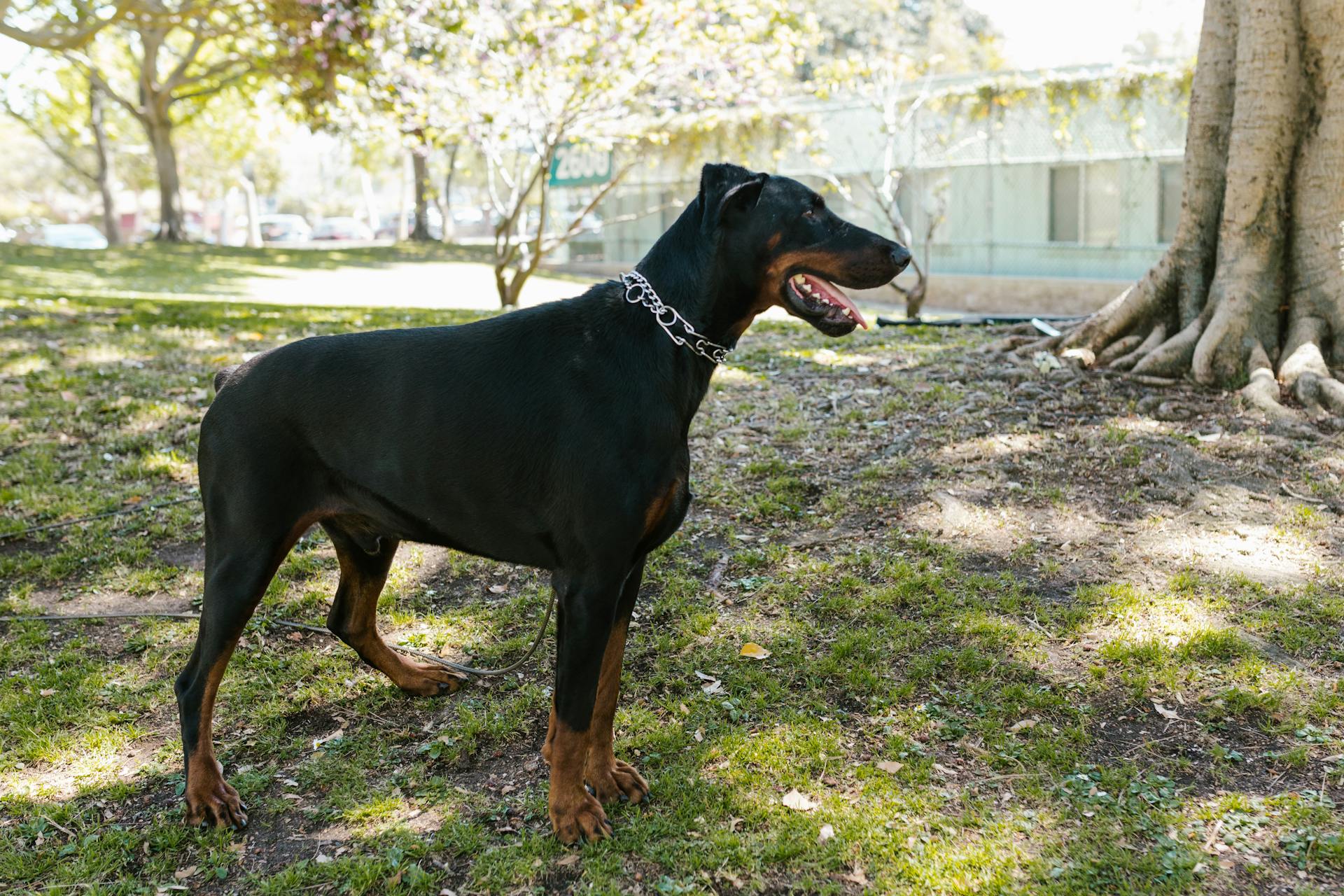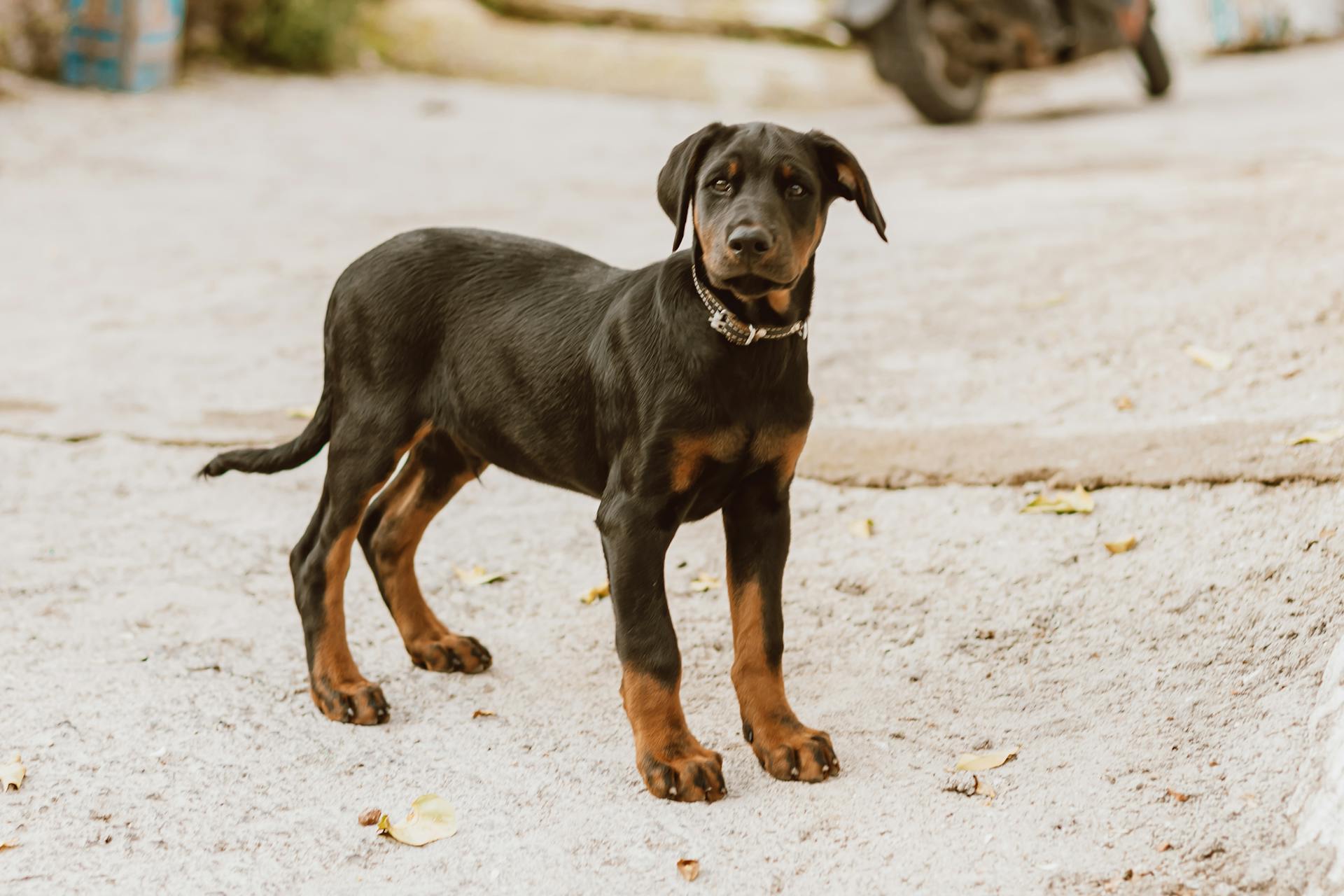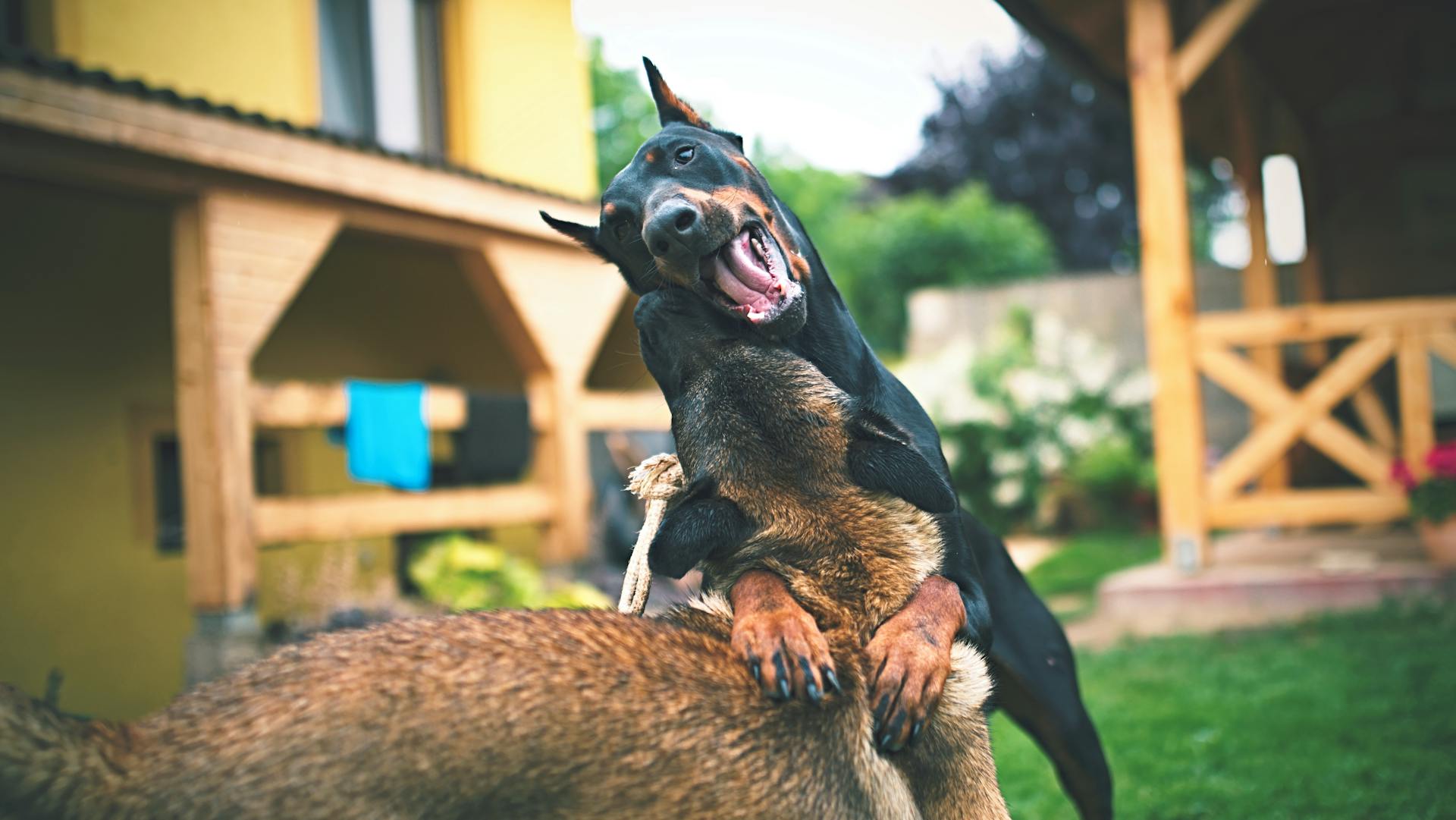
The Doberman Pinscher is a sleek and agile breed that's often misunderstood.
They were originally bred in the late 19th century as guard dogs and police dogs.
Their short, smooth coats come in a variety of colors, including black, red, blue, and fawn.
Doberman Pinschers are known for their intelligence and athleticism, making them a popular choice for active families.
They typically weigh between 60-80 pounds and stand between 24-28 inches tall.
Readers also liked: Dogs Breeds That Start with B
Physical Characteristics
A Doberman Pinscher's physical characteristics are truly one-of-a-kind. They stand more than 2 feet tall, with females typically reaching 26 inches and males closer to 28 inches in height.
Their slender but deceptively heavy build is due to the muscle they pack onto their frames, with males reaching around 100 pounds and most Dobies weighing between 55 to 90 pounds.
A Doberman's coat comes in four recognized colors: black, red, blue, and fawn, all featuring distinctive rust-colored markings on their face, chest, and legs.
Their eyes are dark and piercing, a trait that's hard to miss.
Care and Maintenance
Doberman Pinschers are energetic dogs that require daily mental and physical exercise, such as a long jog or vigorous play for at least an hour per day.
They prefer temperate weather and enjoy activities like retrieving, swimming, tugging, and running. With their athletic build, they excel at dog sports like agility, Schutzhund, and lure coursing.
A well-fenced yard is essential, as Dobermans are capable jumpers. Regular exercise will help burn off excess energy and prevent zoomies, which can be overwhelming for both the dog and its owner.
Their short coats require minimal management, with a weekly or bi-weekly brushing and occasional bathing. Tail docking and ear cropping are also possible, but should be done by an experienced veterinarian.
Dobermans are prone to health issues like dilated cardiomyopathy, Wobbler syndrome, von Willebrand disease, and hip dysplasia. Regular check-ups and DNA testing can help identify potential problems early on.
A DNA test is available for dilated cardiomyopathy, but it's not foolproof and may produce false positives or negatives. Dogs between one and two years old should receive cardiac evaluation, including an electrocardiogram and a baseline Holter heart monitor test.
Intriguing read: Doberman Pinscher Exercise Needs
Consistent training is crucial for Doberman puppies, and working with a professional behaviorist or trainer is highly recommended. They're intelligent and quick to learn, but require patient and positive reinforcement training.
Dobermans are clean animals with low odor, making grooming relatively easy. Regular brushing and occasional wiping down with a wet cloth can reduce shedding and odor, and bathing is only needed every few months.
To prevent bacterial or fungal infections, it's essential to check and clean their ears and brush their teeth regularly. Early socialization is also vital for this intelligent breed, as it can help prevent anxiety and behavioral issues.
A unique perspective: Obedience Training for Doberman Pinscher
Health
The Doberman Pinscher is a breed known for its athleticism and intelligence, but like all breeds, it's not immune to certain health issues. Hip dysplasia is a common concern for Dobermans, and it's essential to have their heart and thyroids checked regularly.
Bloat is another gastrointestinal issue that can affect Dobermans at any point in their lifetime, and it carries a high mortality rate of about 50%. If you suspect your Doberman is experiencing bloat, it's crucial to seek veterinary attention immediately.
For another approach, see: Are Dobermans and Rottweilers Related
Von Willebrand's disease is a blood clotting disorder that can be a problem for Dobermans, especially as they get older. This disease can cause issues with blood clotting, which can be life-threatening.
Before bringing home a Doberman, it's essential to have all the necessary health testing done by the breeder, including those recommended by the OFA. This will give you a clear picture of the dog's health and help you make an informed decision.
Here are some common health issues to watch out for in Dobermans:
- Cardiomyopathy
- Bloat
- Von Willebrand's Disease
- Wobbler's Syndrome
The OFA recommends the following health tests for Dobermans:
- Cardiac
- DNA For VWD
- Hips
- X-Rays
- MRI
- Eye Examination
Temperament and Behavior
The Doberman Pinscher is a highly intelligent breed that can learn complicated tasks with ease. This makes them a great companion for active owners who are willing to dedicate time to their training.
Doberman Pinschers are deeply loyal and courageous canines that require a patient owner who will dedicate themselves to their learning. They thrive when offered lots of attention and positive reinforcement training from their family.
Broaden your view: Pembroke Corgi Training
This breed is not for everyone, and potential owners should do their research before bringing home a Doberman. They need consistency in their schedule and can develop separation anxiety if left alone for too long.
Doberman Pinschers are commonly referred to as "Velcro dogs" because of their deep bond with their family. They will want to stick by your side, so it's essential to prepare and plan for their needs when you're not around.
Kennel training is crucial for this breed, especially with puppies. It's not a place for punishment, but rather a safe spot for them to rest and relax when you're away.
As a breed, Doberman Pinschers are generally quiet, sounding an alarm only when needed. They're also playful and very energetic, making them a great match for families with an active lifestyle.
Recommended read: Doberman Pinscher Not Cropped
Fun Facts and Information
The Doberman Pinscher is an incredibly versatile breed with a rich history. They were adopted by the United States Marine Corps as their official war dog in World War II.
These brave dogs served extensively in both the European and Pacific theaters of operation, saving countless lives along the way. In fact, one Doberman named Cappie even alerted 250 marines to the presence of Japanese troops on the island of Guam, saving their lives.
The Doberman Pinscher has also made a name for itself in the world of dog shows, winning best in show at the Westminster Dog Show four times since their recognition by the AKC in 1908. This includes back-to-back wins by Ch. Rancho Dobe's Storm in 1952 and 1953.
You might be surprised to learn that Dobermans have also made several notable appearances in film and TV, including Zeus and Apollo, the pair of Dobies owned by the titular "Magnum P.I.".
Here are some notable Doberman Pinscher film and TV appearances:
- Zeus and Apollo, the pair of Dobies owned by the titular "Magnum P.I".
- Alpha in the Pixar film "Up",
- Diablo (voiced by Edward James Olmos) in "Beverly Hills Chihuahua."
Frequently Asked Questions
How much is a full blooded Doberman?
A full-blooded Doberman can cost between $1,000 to $2,500+, with show-quality puppies reaching up to $2,500+. This significant investment is worth considering for those who want a purebred Doberman.
What 2 breeds make a Doberman?
The Doberman Pinscher is believed to be a cross between the Rottweiler and the German Pinscher. The exact origins are unclear, but these two breeds are thought to be the foundation of the Doberman Pinscher breed.
Featured Images: pexels.com


